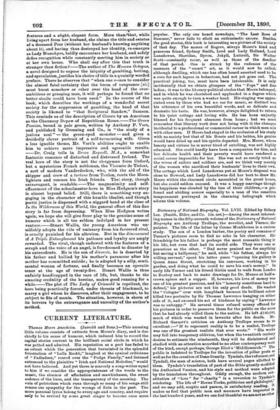CURRENT LITERATURE.
Thomas Moore Anecdotes. (Janold and Sons.)—This amusing little volume consists of extracts from Moore's diary, and is due chiefly to his sense of humour, which induced him to record the capital stories current in the brilliant social circle in which he was petted and admired. His reputation as a poet has faded to an extent which the generation that luxuriated in the splendid Orientalism of "Leila Rookh," laughed at the cynical criticisms of " Fadladeen," roared over the "Fudge Family," and listened entranced to the plaintive " Irish and National Melodies," would not have believed. And yet there is scarcely a song-writer equal to him if we consider the appropriateness of the words to the music, the absence of affectation and .mawkishness, the sweet cadence of the lines, and the transparency of the meaning. The vein of patriotism which inns through so many of his songs still rouses our sympathy for the wrongs of Erin in the past. The more personal lyrics belong to every age and country, and require only to be revival by some great singer to become once more popular. The only one heard nowadays, "The Last Rose of Summer," never fails to elicit an enthusiastic encore. Besides the good stories, this book is interesting as a picture of the society of that day. The names of Rogers, always Moore's kind and generous friend, Sydney Smith, Lord and Lady Holland, Lord Lansdowne, Sheridan, Byron, Jekyll, Luttrell, Sir Walter Scott—constantly recur, as well as those of the dandies of that period. One is struck by the rudeness of the manners of the " smart " set, as it would now be called, although duelling, which one has often heard asserted used to be a cure for such lapses in behaviour, had not yet gone out. The practical joking, too, must have been intolerable. It is only incidentally that we obtain glimpses of the "Fops" and fine. ladies; it was to the literary-political circles that Moore belonged, and in which he was cherished and applauded in a degree which was quite enough to turn a weaker head. His singing was appre- ciated even by those who had n o ear for music, so distinct was his utterance of his own beautiful words, and so delicate and. dramatic his taste. He was, however, always delighted to return. to his quiet cottage and loving wife. He has been unjustly blamed for his frequent absences from home ; but we must remember that literary work does not bring with it the changes incidental to a professional or commercial career in which men mix with other men. If Moore had stayed in the seclusion of his study with no society but that of his Bessie and his babies, his genius would have dried up and his spirits departed. Mrs. Moore, whose beauty and virtues he is never tired of extolling, was not highly educated. She could hardly have been a companion for him, and her delicate health and their poverty would have rendered a social career impossible for her. She was not so sorely tried as the wives of sailors and soldiers are, and we think very meanly of the women who sacrificed their husbands' lives to their own. The cottage which Lord Lansdowne put at Moore's disposal was close to Bowood, and Lady Lansdowne did her best to draw Mr. Moore within the charmed circle assembled in the great house, but she could seldom succeed. It was a happy marriage though its happiness was clouded by the loss of their children,—a pro- found and abiding sorrow especially to a man of the sensitive temperament portrayed in the charming heliograph which adorns this volume.


































 Previous page
Previous page